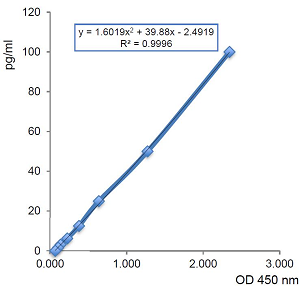IL-1beta (human) ELISA Kit
| Code | Size | Price |
|---|
| AG-45B-0021-KI01 | 96 wells | £410.00 |
Quantity:
Prices exclude any Taxes / VAT
Overview
Regulatory Status: RUO
Target Species: Human
Shipping:
BLUE ICE
Storage:
+4°C
Images
Further Information
Alternate Names/Synonyms:
Interleukin-1beta; IL-1F2
Assay Type:
Sandwich
Detection Type:
Colorimetric
EClass:
32160000
Handling Advice:
After standard reconstitution, prepare aliquots and store at -20°C.Avoid freeze/thaw cycles.Plate and reagents should reach room temperature before use.
Long Description:
Colorimetric Sandwich ELISA Assay. Detects human IL-1beta in serum, plasma and cell culture supernatant. Range: 1.5625 to 100pg/ml. Sensitivity: 0.7pg/ml. The interleukin-1 (IL-1) family is a central mediator of innate immunity and inflammation. IL-1 family members are associated with both the development and progression of inflammatory diseases and have been linked to neurodegenerative and neuroinflammatory diseases. The IL-1 family of cytokines has 11 members, which are further subdivided into three groups, the IL-1, IL-18 and IL-36 subfamilies. The IL-1 cytokine subfamily includes agonists (IL-1alpha, IL-1beta and IL-33) as well as receptor antagonist IL-1Ra. IL-1beta and IL-1alpha exert similar biological effects acting on receptor IL-1R, eliciting pro-inflammatory actions. Unlike IL-1alpha which is both constitutively expressed and active in its 31kDa pro-form, IL-1beta is only produced in its inactive 35kDa pro-form following priming signals, such as pathogen- or damage-associated molecular patterns (PAMPs or DAMPs) and is subsequently cleaved to its 17kDa active form following inflammasome activation in damaged or diseased states. IL-1beta is expressed by activated macrophages and monocytes. Active IL-1beta has known roles in initiating and propagating sterile inflammation, including macrophage recruitment, activation of the pro-inflammatory cytokine interleukin-6 (IL-6) and modulating chemokine expression. IL-1beta, inflammatory caspases and inflammasomes play important roles in several diseases such as sepsis, rheumatoid arthritis, inflammatory bowel disease, atherosclerosis, neuronal injuries, such as Alzheimer's disease, Parkinson's disease, stroke, cerebral ischemic cell death, multiple sclerosis and Down syndrome. Some human hereditary or acquired diseases have been linked to elevated IL-1beta such as cryopyrin-associated periodic syndroms (CAPS) directly linked to NLRP3 mutations.
NCBI, Uniprot Number:
P01584
Package Type:
Box
Product Description:
The interleukin-1 (IL-1) family is a central mediator of innate immunity and inflammation. IL-1 family members are associated with both the development and progression of inflammatory diseases and have been linked to neurodegenerative and neuroinflammatory diseases. The IL-1 family of cytokines has 11 members, which are further subdivided into three groups, the IL-1, IL-18 and IL-36 subfamilies. The IL-1 cytokine subfamily includes agonists (IL-1alpha, IL-1beta and IL-33) as well as receptor antagonist IL-1Ra. IL-1beta and IL-1alpha exert similar biological effects acting on receptor IL-1R, eliciting pro-inflammatory actions. Unlike IL-1alpha which is both constitutively expressed and active in its 31kDa pro-form, IL-1beta is only produced in its inactive 35kDa pro-form following priming signals, such as pathogen- or damage-associated molecular patterns (PAMPs or DAMPs) and is subsequently cleaved to its 17kDa active form following inflammasome activation in damaged or diseased states. IL-1beta is expressed by activated macrophages and monocytes. Active IL-1beta has known roles in initiating and propagating sterile inflammation, including macrophage recruitment, activation of the pro-inflammatory cytokine interleukin-6 (IL-6) and modulating chemokine expression. IL-1beta, inflammatory caspases and inflammasomes play important roles in several diseases such as sepsis, rheumatoid arthritis, inflammatory bowel disease, atherosclerosis, neuronal injuries, such as Alzheimer's disease, Parkinson's disease, stroke, cerebral ischemic cell death, multiple sclerosis and Down syndrome. Some human hereditary or acquired diseases have been linked to elevated IL-1beta such as cryopyrin-associated periodic syndroms (CAPS) directly linked to NLRP3 mutations.
Range:
1.5625 to 100pg/ml
Sample Type:
Cell Culture Supernatant, Plasma, Serum
Sensitivity:
0.7pg/ml
Specificity:
Detects human IL-1beta in serum, plasma and cell culture supernatant.
Transportation:
Non-hazardous
UNSPSC Category:
ELISA Kits
UNSPSC Number:
41116126
Use & Stability:
12 months after the day of manufacturing. See expiry date on ELISA Kit box.



